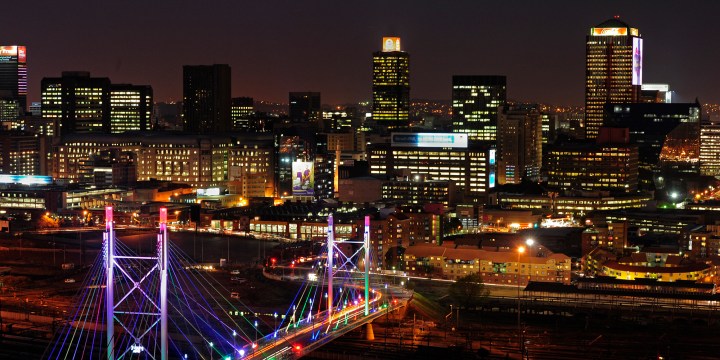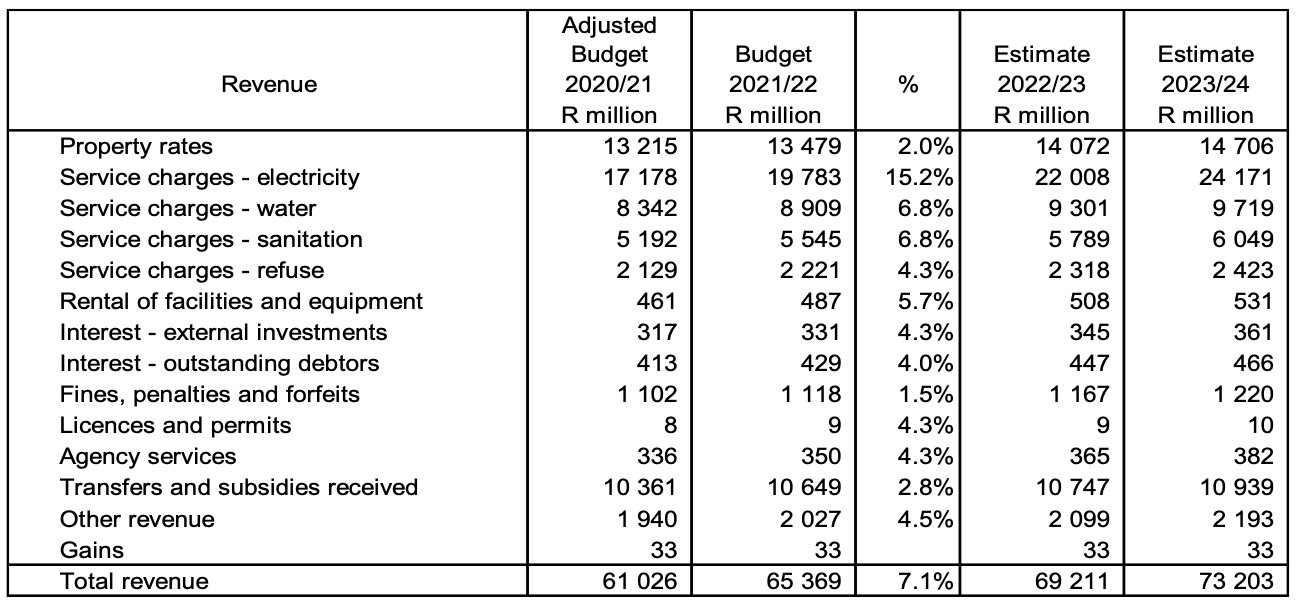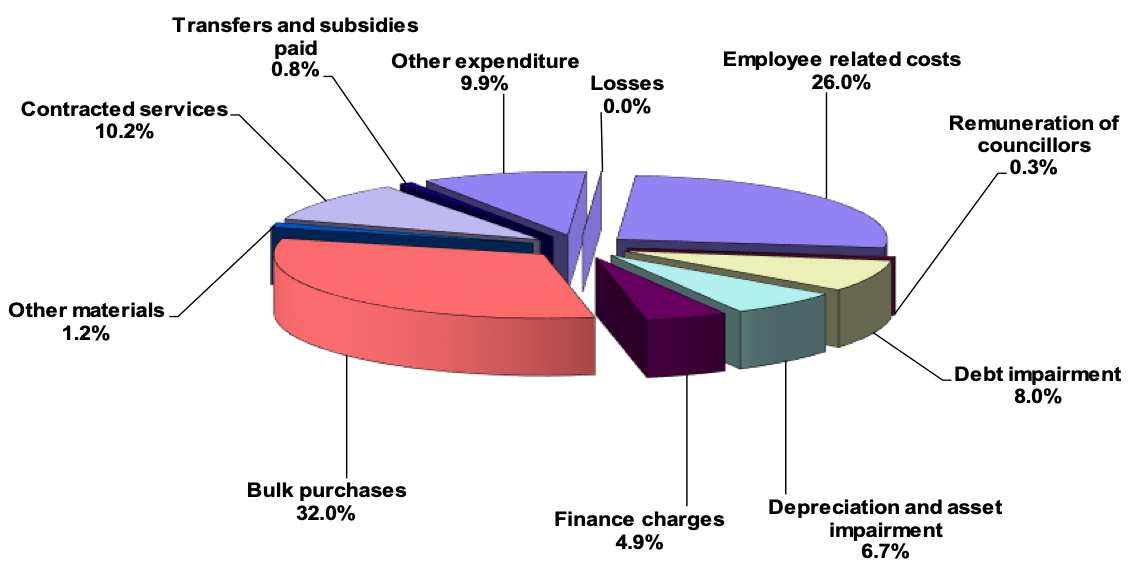CITY OF JOBURG BUDGET
Africa’s world-class city: Charges go up, up, up as services go down, down, down

A large proportion of Johannesburg’s budget is spent on staff and contractor costs, and there’s simply not enough money for what’s required to deal with crumbling electricity, water, stormwater and sanitation infrastructure.
For residents of Johannesburg, the cost of living here is world-class, but services in this city of five million people – that generates 15% of South Africa’s wealth – are not.
Finance MMC Jolidee Matongo tabled a R73.3-billion budget on 25 May, which will be funded by inflation-busting charges. Electricity costs are going up by 14.5%, water by 6.6% and sanitation by 6.8%. However, the city has held the property rates tax increase at a relatively low 2%.
The cost of electricity will more than double from last year, although the city still kept it lower than the 15% allowable increase granted this year by electricity regulator, Nersa.
But services in “Africa’s world-class city” are deteriorating quickly, with power and water cuts the order of the day.
While Joburg mayor Geoff Makhubo has declared a war on potholes – and there is progress in patching the streets – the road network on the whole is in decline.
Matongo warned that big electricity users are leaving the national grid (because it is so unreliable and the cost of renewables is coming down), which means residential consumers could pay higher tariffs in the years to come.
If you live in Johannesburg, the chart below shows what the cost of city living is going to look like over the medium term.
Covid-19 has hit Johannesburg’s finances hard, so if you own a car here, you can expect to pay higher vehicle licensing and other fees and also get stopped by cops and fined more often.
The city is offering a rates amnesty for those in debt – it’s individually negotiated according to income levels and applies to debt older than 90 days.
The chart below shows how dependent the city is on the service charges it levies on water, electricity and sanitation. Daily Maverick reported last year that the City of Johannesburg charges the most for electricity of all metros, and there is little chance of that abating. City Power brings in 30.3% of revenue through the additional costs it levies on residents to deliver electricity into homes.
The chart below shows you how revenue is going to be billed by the city, and you can see that the trajectory is up, up and up.
The water shortages which became life-threatening at the weekend, as Mark Heywood reported here, can be reduced with a budget targeted at infrastructure. But the pie chart of city expenditure shows you how the staff payroll (at 26% of expenditure) and the contracted service costs (10.2%) crowd out spending on infrastructure.
While debt has been contained at under 40% of total city GDP, debt-related costs are rising and the rates amnesty will have to be funded somewhere.
Matongo said Johannesburg is going to replace its red fleet as fire engine shortages have been blamed for many fires going unfought, including the recent inferno that devastated Charlotte Maxeke Hospital.
The chart below shows the budget for the city’s key utility infrastructure – but the budgeted amounts are too low for the scale required to deal with crumbling electricity, water, stormwater and sanitation infrastructure.
The city’s budget is not aligned with the real population it supports and the stress is borne in the infrastructure.
While Makhubo has promised a war on potholes, the Johannesburg Roads Agency is getting only R53.5-million for repairs. A drive through any part of the city will show that almost the entire road network requires resurfacing.
Only R3.7-billion of the total budget will be spent on infrastructure.
The city needs to replicate Soweto’s spatial growth in areas like Orange Farm and Ivory Park, said Matango. He said that Soweto had once been a “dusty township” but was now a city.
“It is the intention to do in Kliptown what we did in Soweto,” said Matango.
In a city with the highest number of unemployed young people, a WiFi connection can be a vital connection to a job opportunity. So, the 1,000 Wi-Fi spots being rolled out, and which were announced in the budget, are welcome.
R100-million will be spent on council-owned flats and old-age homes. Many of these are falling apart and yet remain in high demand for the older indigent communities of Johannesburg.
Most of the development budget is going into Kliptown, Ivory Park, Riverlea and Orange Farm. Orange Farm will get an additional budget of R128-million. The Dube hostel renewal gets R23.1-million; Fleurhof housing an additional R57.3-million; Lufhereng gets an additional R14-million and various informal settlements get an upgrading budget of R14.3-million.
Election year budget
Johannesburg’s local politics are among the most contested in the country and the city is currently run by a coalition government. With four months to go to municipal elections, it’s not surprising that this is an election year budget.
The ANC is spending most where its potential support is biggest, and there is a lot of pump-priming for the Johannesburg youth vote. For example, Matango has found an additional R60-million for unspecified “youth development” projects city-wide, and to City Power for “co-production activities as part of accelerated service delivery in repairs and maintenance”.
There is a set-aside of 30% for small and medium-sized contractors across budgets which, if you know the city, are often used as patronage funds across all wards and by all parties.
Matango also announced that 640,000 food parcels will be distributed by the city. If it goes via the established networks of welfare organisations, it will be great food relief – but if it’s going to be given out by politicians, then this is also part of an election budget, as political parties use food parcels as election material. DM
























 Become an Insider
Become an Insider
The law of diminishing returns – the only thing the ANC is really, really good at.
Isn’t it uncanny that this becomes the norm rather than the exception.
Living in Johannesburg is becoming like going to a restaurant and buying a really nice meal for the waitrons, then yourself going home hungry.
It would be cheaper for the taxpayer if the authorities would replace vote buying with vote rigging.
Would be interesting to know what the City’s salary bill is. Perhaps if this was cut, there would be more money in the pot for vital services and less wastage on non performers?
paragraph 3 Either shoddy editing or the writer needs to dig out her old maths text book. ‘Increase in cost will double’ not ‘the cost will double’.
Aside from that a frightening assessment of the ANC’s inability to govern effectively.